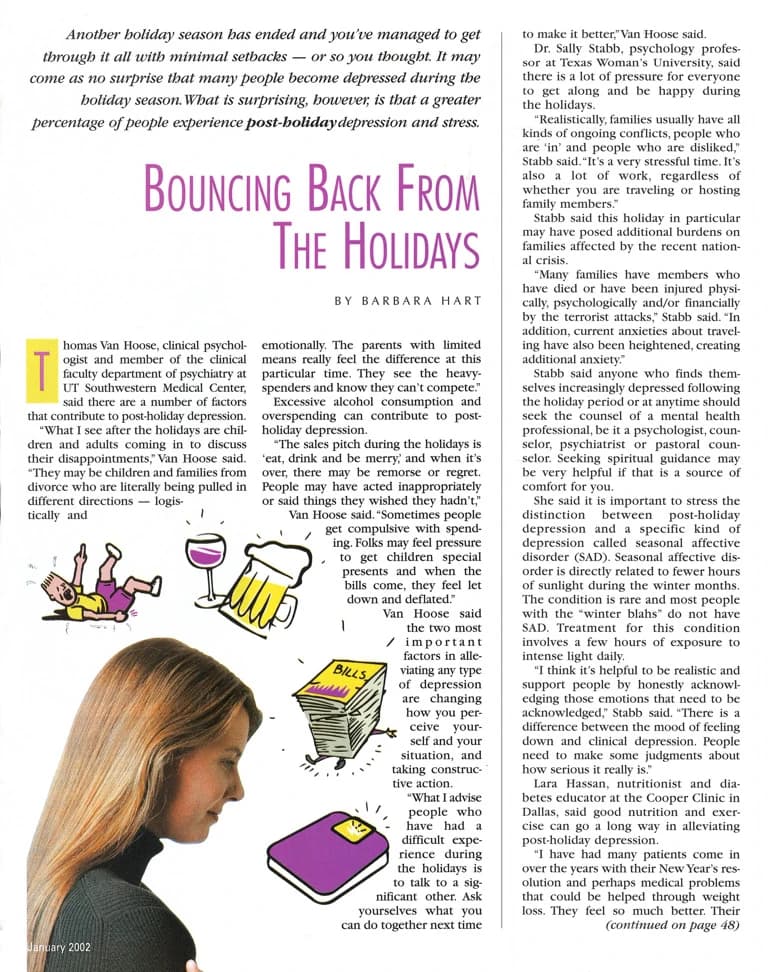Bouncing Back From The Holidays
Thomas Van Hoose, clinical psychologist and member of the clinical faculty department of psychiatry at UT Southwestern Medical Center, said there are a number of factors that contribute to post-holiday depression.
"What I see after the holidays are children and adults coming in to discuss their disappointments," Van Hoose said. "They may be children and families from divorce who are literally being pulled in different directions – logistically and emotionally. The parents with limited means really feel the difference at this particular time. They see the heavy spenders and know they can't compete."
Excessive alcohol consumption and overspending can contribute to post holiday depression.
"The sales pitch during the holidays is ‘eat, drink and be merry,’ and when it's over, there may be remorse or regret. People may have acted inappropriately or said things they wished they hadn't," Van Hoose said. "Sometimes people get compulsive with spending. Folks may feel pressure to get children special presents and when the bills come, they feel let down and deflated.”
Van Hoose said the two most important factors in alleviating any type of depression are changing how you perceive yourself and your situation, and taking constructive action.
"What advise people who have had a difficult experience during the holidays is to talk to a significant other. Ask yourselves what you can do together next time to make it better,” Van Hoose said.
Dr. Sally Stabb, psychology professor at Texas Woman's University, said there is a lot of pressure for everyone to get along and be happy during the holidays.
"Realistically, families usually have all kinds of ongoing conflicts, people who are ‘in’ and people who are disliked," Stabb said. "It's a very stressful time. It's also a lot of work, regardless of whether you are traveling or hosting family members.”
Stabb said this holiday in particular may have posed additional burdens on families affected by the recent national crisis.
"Many families have members who have died or have been injured physically, psychologically and/or financially by the terrorist attacks,” Stabb said. "In addition, current anxieties about traveling have also been heightened, creating additional anxiety.”
Stabb said anyone who finds themselves increasingly depressed following the holiday period or at anytime should seek the counsel of a mental health professional, be it a psychologist, counselor, psychiatrist or pastoral counselor. Seeking spiritual guidance may be very helpful if that is a source of comfort for you.
She said it is important to stress the distinction between post-holiday depression and a specific kind of depression called seasonal affective disorder (SAD). Seasonal affective disorder is directly related to fewer hours of sunlight during the winter months. The condition is rare and most people with the "winter blahs" do not have SAD. Treatment for this condition involves a few hours of exposure to intense light daily.
"I think it's helpful to be realistic and support people by honestly acknowledging those emotions that need to be acknowledged," Stabb said. "There is a difference between the mood of feeling down and clinical depression. People need to make some judgments about how serious it really is."
Lara Hassan, nutritionist and diabetes educator at the Cooper Clinic in Dallas, said good nutrition and exercise can go a long way in alleviating post-holiday depression.
"I have had many patients come in over the years with their New Year's resolution and perhaps medical problems that could be helped through weight loss. They feel so much better. Their [...]


